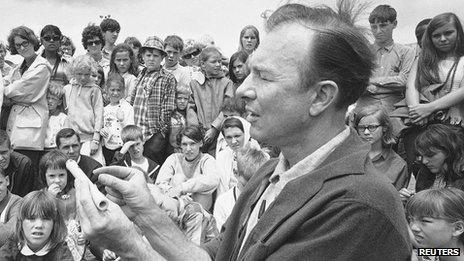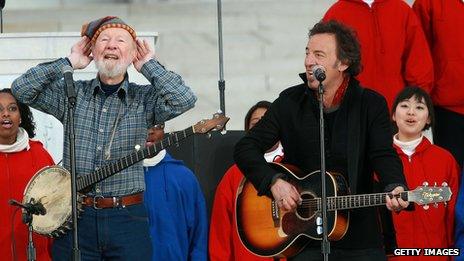Obituary: Pete Seeger
- Published

Seeger went to Harvard but left to travel across America
With such hits as Where Have All the Flowers Gone? and If I Had a Hammer, Pete Seeger used his mastery of gentle folk music to address the harsh realities of a changing world.
With their understated but challenging lyrics, Seeger's songs became anthems of political protest.
In Barcelona in 1971, students rioted when Franco banned one of Seeger's concerts.
Born in New York with a musicologist for a father and concert violinist for a mother, Seeger grew up with music in his bones but lacked creative direction.
Schooled in the banjo, guitar and ukulele, Seeger remained a musical fish out of water until he chanced upon a square dance festival in North Carolina.

Seeger ran workshops at various music festivals, including this instrument making workshop in Newport
There, the "frank and honest" lyrics and rippling melodies made folk music for Seeger a natural medium of expression.
He made it to Harvard, but decided that music was his only talent, and abandoned his formal education to travel across America.
He discovered the concerns of the common man, and expressed them with his banjo, performing at union meetings and for radical groups.
Folklorist Alan Lomax said that folk music was born on 3 March 1940. This was the date Seeger met Woody Guthrie, and together they continued their cross-country journey.
That year, they formed the Almanac Singers, a loosely formed musical collective, dedicated to bringing all forms of social injustice to public attention.
The Almanac Singers initially recorded labour movement and pacifist songs. But when Seeger was drafted into the US Army during the war, the Almanacs gained a popularity that unsettled their left-leaning fanbase.
Falling foul of traditional union movements, Seeger wrote his most defiantly optimistic ode to change in the late 1940s.

Seeger performed with Bruce Springsteen at the Obama inaugural celebration in 2009
If I Had a Hammer brought him into artistic collaboration with Lee Hays and together they formed The Weavers, finding more success with the Leadbelly song Goodnight Irene. Seeger maintained that his music belonged to the people.
Seeger joined the Communist Party in the early 1940s but left in 1951 - he was later called before McCarthy's UnAmerican Activities Committee, indicted and briefly jailed, when he refused to testify to his political associations.
Although the case was thrown out by the Appeals Court, Seeger was thrown off the television networks for 17 years.
This suppression only fuelled his creativity, and he adopted cultural guerrilla tactics to make sure his music was heard.
Seeger sang in colleges, schools and on local radio and television, slipping away before anyone could object.
Natural protestor
Civil rights, peace and labour movements all gained a higher profile when Seeger got involved. And a new generation came to recognise the authority of this veteran maverick in 1965.
He joined a civil rights march in Alabama, where his version of We Shall Overcome first became an American anthem of defiance.
Protesting came naturally to Seeger. In the late 1960s, he joined the movement opposing the Vietnam war, and he later sang for Solidarity, the Polish trade union.
Seeger increasingly channelled his energies into environmental causes. These became personal once he had built his home beside the Hudson, and he became involved in the campaign to cleanse the river of industrial waste.
His Clearwater Organisation offered education programmes, sailing instruction and festivals.
Inducted into the Rock and Roll Hall of Fame in 1996, he was awarded a Grammy for best traditional folk album a year later.
He was still recording into old age, joining other artists expressing opposition to George W Bush's incursion into Iraq.
Seeger never toppled a government with the weight of his banjo.
But he was satisfied if his little songs inspired a different way of looking at bigger troubles.
- Published28 January 2014
- Published28 January 2014